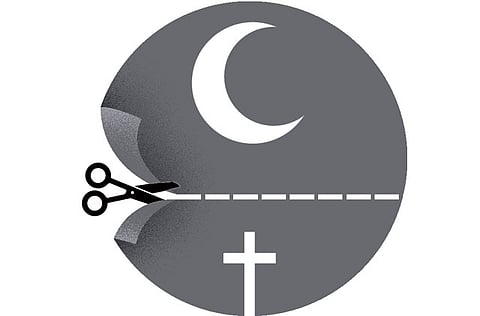Growing challenges to Arabism
Sectarian tensions threaten to undermine a tradition of religious co-existence in the Arab world and change its identity

Despite WikiLeaks' allegations that the Sudanese president stashed $9 billion (Dh33.03 billion) in British banks, which, if true, would make him a winner of sorts, Omar Al Bashir is likely to lose the January 9 referendum on independence.
Largely as a direct consequence of Khartoum's brutal behaviour during the past few years, partition is literally guaranteed, and the African continent is likely to welcome its 54th state. Regrettably, South Sudan (eight million people) will become a ‘Christian state', while Al Bashir will transform the North (34 million) into a ‘Muslim state'.
Coming a few days after the attack on the Coptic church in Alexandria, which killed 25 and injured nearly a 100 worshippers, one wonders how many will be butchered in Khartoum churches?
What can be done to prevent such medieval onslaughts and, as important, who will finally appreciate that these confrontations threaten Arabism?
Beyond an automatic declaration that Al Qaida was responsible for the cowardly attack, few can deny that a deadly campaign against Arab Christians is unfolding in front of our eyes.
The so-called Islamic State of Iraq, which claimed responsibility for a series of bombings in that hapless country throughout 2010, and that culminated in the October 31 massacres inside the Baghdad Syriac Catholic Cathedral (58 dead), may well be behind the Alexandria bloodbath too.
Indeed, the aim seems to be clear: kill the largest numbers of Copts, who make up about 10 per cent of the country's 84 million population, to purify Egypt.
Unlike their Sudanese counterparts, however, it is nearly impossible to differentiate Egyptian Christians from their Muslim brethren although recent clashes highlighted dormant tensions. To be sure, Alexandria is home to an active Salafi Islamist movement and is a Muslim Brotherhood stronghold, but it takes an Egyptologist to identify divergences.
Sadly, fanatics within the ranks with no more than rudimentary religious knowledge tend to blame social and economic difficulties on the slightly better off, even if Egypt boasts a relatively cohesive national fabric.
Recipe for disaster
Some Egyptians, ironically both Muslim as well as Christian, perceive themselves in puritanical terms. They insist that they need to live in a place of religious "purity," which is a recipe for disaster, and which reminds one of what Israeli Prime Minister Benjamin Netanyahu insisted in his vision.
Lest we forget, he demanded that a peace agreement with the future State of Palestine could only be negotiated after Palestinians — and presumably the rest of the Arab world — recognised that Israel was an exclusive homeland for the Jewish people.
It is within these parameters that Cairo, Khartoum and, for that matter, the entire Arab world ought to evaluate the consequences of the latest bloodshed.
For Cairo to regain the upper hand, President Hosni Mubarak must do more than simply declare in a national television address, when he asserted that Egypt could rely on its stalwart history of national unity.
This is no longer enough. In fact, Muslim-Christian tensions in Egypt are too long to list, and Cairo ought to rekindle its tolerant traditions if it hopes to prevent sectarian tensions that will surely undermine a distinguished tradition of religious co-existence. What can be done in the short-term?
On January 6, the Coptic Orthodox Church, which is part of Oriental Orthodoxy [six hierarchically independent denominations: Armenian Apostolic, Coptic, Eritrean, Ethiopian, Indian (Malankara), and Syrian Orthodox Churches]—will celebrate Christmas along with the vast majority of their Eastern brethren (mostly in the Slavic world).
It behooves Egyptian leaders, both religious and political, to attend Coptic services to demonstrate their backing. The vast majority of Egyptian Muslims condemned the cowardly attacks and expressed solidarity with their neighbours but this is not sufficient. There are times when actions are necessary and this is one of those times.
Mubarak and Shaikh Ahmad Al Tayeb, the erudite Imam of Al Azhar, need to revive their country's tradition of enlightened civil and religious rights. They ought to demonstrate what it means to adopt a non-sectarian national spirit where the law considers all citizens to be equal.
As Tariq Al Homayed opined in Al Sharq Al Awsat, it is time for Egypt to look itself in the mirror and face internal problems like a grown-up, precisely to eliminate challenges to its stability.
No one, not even Mohammad Mahdi Akef, a former Muslim Brotherhood General Guide, ought to have the audacity to openly proclaim: "To hell with Egypt"!
If the leading Arab nation cannot enjoy internal security, no Arab country can aspire for such safety, which will make Netanyahu's dreams come true. Alongside a Jewish state, the Middle East will then have a Christian state in South Sudan and, perhaps statelets in Lebanon [a Druze fiefdom next to Maronite Duchies — one for General Michel Aoun and another for his rivals — as well as a Shiah Wilayah]. It may be worth reminding ourselves that there are those who are also planning for a division of Iraq into three separate entities too.
Secessionism in the Sudan is a dangerous step as are the many attacks on religious institutions in Egypt, Iraq and elsewhere. Lest this is stopped now, League of Arab States officials are advised to make preparations to welcome additional members and, most surely, even change their moniker.
Dr Joseph A. Kechichian is a commentator and author of several books on Gulf affairs.



